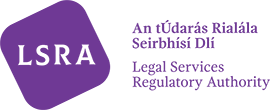The LSRA today publishes its second report under its independent complaints handling regime which shows it received 605 complaints about solicitors and barristers in a six month period.
Today’s report is based on complaints made to the legal services regulator between 7 March and 6 September 2020. The statistical data in the report includes:
- The LSRA’s Complaints and Resolutions Unit received a total of 605 complaints between 7 March and 6 September 2020. Of these, 587 related to solicitors and 18 related to barristers.
- A total of 346 complaints (57%) alleged misconduct, with 213 (35%) of complaints about alleged inadequate legal services and a further 46 (8%) related to alleged excessive costs (overcharging).
- A total of 169 of complaints received during the period were closed, with 96 of these deemed inadmissible and 23 withdrawn. A total of 436 complaints remain under investigation.
- A total of 50 complaints were resolved informally with the assistance of LSRA complaints staff during what is known as the pre-admissibility stage – that is before the LSRA makes a determination that a complaint is admissible.
- The Complaints and Resolutions Unit received a total of 1,271 phone calls and emails during the six month period requesting information and/or complaint forms.
- Among the areas of legal services complained about were wills and probate, litigation, conveyancing and family law.
- The number of complaints received in this reporting period is slightly lower than in the first five months of operation, when the LSRA received a total of 636 complaints, of which 342 related to misconduct, 238 were about inadequate services, and 56 related to excessive costs.
Commenting on the complaints report, the LSRA’s Chief Executive Dr Brian Doherty said:
“We have handled roughly the same volume of queries and complaints in the six months covered by this report as we did in our initial period. This is despite not having access to our offices, and with all complaints staff working remotely due to necessary restrictions introduced in response to the Covid-19 pandemic. It is heartening to see that consumers of legal services have continued to engage with us, raise issues and queries and submit complaints.
“Where possible and appropriate, we make every effort to resolve complaints informally with legal practitioners and clients. Today’s report shows an encouraging number of complaints being resolved at an early stage. This is due primarily to the efforts of legal practitioners to engage with the new complaints system, reflect on the complaints made and attempt to repair and mend their relationships with their clients. This is both encouraging and to be encouraged.”
Dr Doherty highlighted the fact that poor communication between legal practitioners and clients is a key feature of most complaints received.
“Complainants continually raise the issue that they were not adequately informed by their legal practitioner as to the cost and time or the risks involved in taking or defending legal proceedings. Probate and wills continue to attract complaints from dissatisfied executors and beneficiaries and we have received further complaints in relation to the non-payment of barristers’ fees by solicitors,” he added.
Today’s report highlights emerging themes in complaints and identifies areas where it may be possible to learn lessons and to raise standards. The report also includes anonymised case studies which are aimed at helping both consumers and legal service providers learn from the LSRA’s examination of individual complaints.
Note to Editors
The LSRA took over responsibility for complaints about legal practitioners from the professional bodies for solicitors and barristers on 7 October 2019. The Legal Services Regulation Act 2015 requires the LSRA to publish a report on the operation of its complaints function every six months. The first complaints report, issued in April 2020, covered the period from 7 October 2019 to 6 March 2020.
The LSRA receives and investigates complaints against legal practitioners under three grounds:
- that the legal services provided by a legal practitioner were of an inadequate standard;
- that the amount of costs sought by a legal practitioner was excessive; or
- that a legal practitioner performed an act or omission which amounts to misconduct under the Act.
The Legal Services Regulation Act 2015 places informal complaints resolution at the heart of the new independent regime, and the LSRA’s qualified staff are affiliated to the Mediators’ Institute of Ireland.
